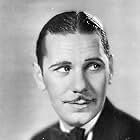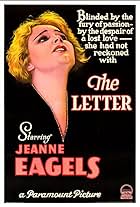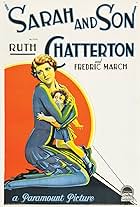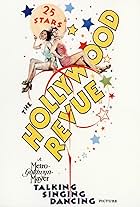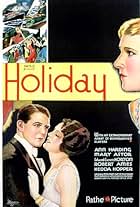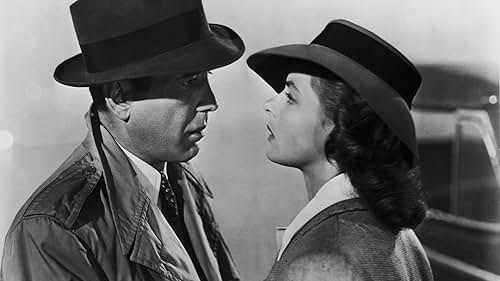AVALIAÇÃO DA IMDb
6,4/10
1,5 mil
SUA AVALIAÇÃO
Adicionar um enredo no seu idiomaThe trial and tribulations of a strong-willed woman who elopes and gives birth out of wedlock without telling her ex-husband.The trial and tribulations of a strong-willed woman who elopes and gives birth out of wedlock without telling her ex-husband.The trial and tribulations of a strong-willed woman who elopes and gives birth out of wedlock without telling her ex-husband.
- Indicado a 1 Oscar
- 2 vitórias e 1 indicação no total
Wally Albright
- Jack Merrick
- (as Wally Albright Jr.)
Blanche Friderici
- Miss Potter - Nurse
- (as Blanche Frederici)
Henry Armetta
- Barber
- (não creditado)
Brooks Benedict
- Reporter
- (não creditado)
Billy Bevan
- Reporter
- (não creditado)
Ed Brady
- Fred - the Moving Man
- (não creditado)
Allan Cavan
- Doctor
- (não creditado)
Richard Cramer
- Reporter
- (não creditado)
Count Cutelli
- Vocal Effects
- (não creditado)
Bobby Dunn
- Milkman
- (não creditado)
Avaliações em destaque
The Trespasser (1929)
*** (out of 4)
Strange but winner tale of a poor but pure woman (Gloria Swanson) who marries the son (Robert Ames) of a millionaire but when his father finds out he convinces the son to have the marriage annulled. We flash-forward eighteen months and the woman has given birth to a son but she decides to keep this news from the real father until a few bad choices forces her to confront her past. THE TRESPASSER was Swanson first talkie and it also won her a Best Actress Oscar nomination, which she certainly deserved and for my money she's a lot better than Norma Shearer was in THE Divorcée. I'll admit that there's way too much sugar in some of the scenes and I'd say that the final thirty-minutes don't make a bit of sense but there's no question that the film kept me glued to what was going on and you can't help but get caught up in everything. I think a lot of the credit has to go to Swanson who really does deliver a very strong performance. I've read a few reviews stating that her facial gestures are too over-the-top, which might be true but I still think the pain of her character is nailed by the actress and she really brings this character to life. Ames isn't nearly as good as the one-day husband but he does get to shine in a few scenes as does Kay Hammond as the second wife and Henry B. Walthall has a nice part as well. There's no doubt that the film contain some flaws and for the life of me I never could figure out what Swanson's character was thinking and especially at the end. I won't ruin what happens but we have something predictable happen and then it's followed up with something so sugar-coated and worst of all is that it happens out of nowhere. Still, the incredibly strong performance by Swanson makes up for any flaws and film buffs should enjoy it.
*** (out of 4)
Strange but winner tale of a poor but pure woman (Gloria Swanson) who marries the son (Robert Ames) of a millionaire but when his father finds out he convinces the son to have the marriage annulled. We flash-forward eighteen months and the woman has given birth to a son but she decides to keep this news from the real father until a few bad choices forces her to confront her past. THE TRESPASSER was Swanson first talkie and it also won her a Best Actress Oscar nomination, which she certainly deserved and for my money she's a lot better than Norma Shearer was in THE Divorcée. I'll admit that there's way too much sugar in some of the scenes and I'd say that the final thirty-minutes don't make a bit of sense but there's no question that the film kept me glued to what was going on and you can't help but get caught up in everything. I think a lot of the credit has to go to Swanson who really does deliver a very strong performance. I've read a few reviews stating that her facial gestures are too over-the-top, which might be true but I still think the pain of her character is nailed by the actress and she really brings this character to life. Ames isn't nearly as good as the one-day husband but he does get to shine in a few scenes as does Kay Hammond as the second wife and Henry B. Walthall has a nice part as well. There's no doubt that the film contain some flaws and for the life of me I never could figure out what Swanson's character was thinking and especially at the end. I won't ruin what happens but we have something predictable happen and then it's followed up with something so sugar-coated and worst of all is that it happens out of nowhere. Still, the incredibly strong performance by Swanson makes up for any flaws and film buffs should enjoy it.
THE TRESPASSER (United Artists, 1929), a Joseph Kennedy Presentation, written and Directed by Edmund Goulding, stars silent screen actress Gloria Swanson (1898-1983) in her talking motion picture debut. Following her success in the title role of the silent edition of SADIE THOMPSON (1928), for which she earned an Academy Award nomination, her performance for THE TRESPASSER also got Swanson her second consecutive nomination in a row. For anyone familiar with the name of Gloria Swanson, should know her best as Norma Desmond in SUNSET BOULEVARD (Paramount, 1950), hailed by many as her greatest movie achievement of her entire career. Though she registered quite well in talkies, the films that followed simply failed to recapture the Swanson legend a decade ago, yet THE TRESPASSER is an exception.
Opening title: "Somewhere in the Loop." Marion Donnell (Gloria Swanson), is an efficient stenographer working for Hector Ferguson (Purnell B. Pratt), a Chicago corporation attorney. Though a good worker liked by many, including Mr. Fuller (Henry B. Walthall), Marion informs Ferguson this to be her last day in his employ, for that she's to go and elope with Jack Merrick (Robert Ames), the only son of a wealthy businessman, John Merrick Sr. (William Holden - NOT the same William Holden of Swanson's SUNSET BOULEVARD). Marion's honeymoon is interrupted by the arrival of Jack's snobbish father, who claims Marion to be a fortune hunter after his money. He talks Jack into annulling the marriage, to follow up with a big engagement and wedding later on. Insulted by his accusations, and feeling Jack not man enough to stand up to his father, Marion walks out on him, much to the pleasure of Merrick. Eighteen months later, Marion, living a life on her own, is the mother of Jack's infant son, while Jack has married debutante and childhood sweetheart, Catherine "Flip" Carson (Kay Hammond), the woman of Merrick's choice. As baby Jackie is looked after during the day by Miss Potter (Blanche Frederici), Marion is back in the employ of Mr. Ferguson. Marion soon suffers from a mental breakdown after learning Jack and his new bride met with a serious automobile smashup while honeymooning in Paris. Ferguson, a married man in love with Marion, helps her out of her financial straits by supplying her a luxury apartment as well as making her his mistress. Later, Ferguson collapses. Being close to death, he sends for Marion to be with him at his home, regardless of his wife's (Mary Forbes) presence by his deathbed. After Ferguson death, Marion finds that he had left her a will entrusting $500,000 to to both her and her baby, but she refuses to accept it. Jack soon learns that he's the father of Marion's three-year- old son (Wally Albright). This soon causes trouble for Marion when Mr. Merrick returns to the scene demanding Jackie be taken away from Marion and placed into the custody of Jack and his wheelchair-bound wife, who's unable to bear forth children of her own.
If the story sounds overly familiar, it was later remade under the direction of Edmund Goulding re-titled THAT CERTAIN WOMAN (Warner Brothers, 1937) starring Bette Davis (Mary); Henry Fonda (Jack); Anita Louise (Flip) and Donald Crisp (Merrick). While parts of the story differs greatly from the original, with the pacing being a bit slower, the screenplay and climax remains basically the same. Aside from Swanson's natural dramatic performance, her rendition to "Love, Your Magic Spell is Everywhere" (by Elsie Janis and Edmund Goulding) and "Toselli Serenade" leaves a bit to be desired. She's a much better actress than a singer. The old looking Robert Ames (1889- 1931) seems miscast as the millionaire playboy, in a role that might have gone to the youthful newcomer, Fredric March. Also in the cast are Henry Armetta (The Barber); Allan Cavan (The Doctor); and Stuart Erwin (The Newspaper Reporter), among others.
Long unseen in decades, THE TRESPASSER (title not to be confused with a Republic 1947 production starring Dale Evans) made its cable television premiere on Turner Classic Movies (TCM Premiere: December 14, 2011), as part of its tribute and film restoration work from the George Eastman House. It's also available on DVD. Clocked at 90 minutes, THE TRESPASSER, which somewhat suffers a little from acid stain film distortion and Swanson's singing, is still entertaining and surprisingly better in style than the better known Bette Davis remake. (***)
Opening title: "Somewhere in the Loop." Marion Donnell (Gloria Swanson), is an efficient stenographer working for Hector Ferguson (Purnell B. Pratt), a Chicago corporation attorney. Though a good worker liked by many, including Mr. Fuller (Henry B. Walthall), Marion informs Ferguson this to be her last day in his employ, for that she's to go and elope with Jack Merrick (Robert Ames), the only son of a wealthy businessman, John Merrick Sr. (William Holden - NOT the same William Holden of Swanson's SUNSET BOULEVARD). Marion's honeymoon is interrupted by the arrival of Jack's snobbish father, who claims Marion to be a fortune hunter after his money. He talks Jack into annulling the marriage, to follow up with a big engagement and wedding later on. Insulted by his accusations, and feeling Jack not man enough to stand up to his father, Marion walks out on him, much to the pleasure of Merrick. Eighteen months later, Marion, living a life on her own, is the mother of Jack's infant son, while Jack has married debutante and childhood sweetheart, Catherine "Flip" Carson (Kay Hammond), the woman of Merrick's choice. As baby Jackie is looked after during the day by Miss Potter (Blanche Frederici), Marion is back in the employ of Mr. Ferguson. Marion soon suffers from a mental breakdown after learning Jack and his new bride met with a serious automobile smashup while honeymooning in Paris. Ferguson, a married man in love with Marion, helps her out of her financial straits by supplying her a luxury apartment as well as making her his mistress. Later, Ferguson collapses. Being close to death, he sends for Marion to be with him at his home, regardless of his wife's (Mary Forbes) presence by his deathbed. After Ferguson death, Marion finds that he had left her a will entrusting $500,000 to to both her and her baby, but she refuses to accept it. Jack soon learns that he's the father of Marion's three-year- old son (Wally Albright). This soon causes trouble for Marion when Mr. Merrick returns to the scene demanding Jackie be taken away from Marion and placed into the custody of Jack and his wheelchair-bound wife, who's unable to bear forth children of her own.
If the story sounds overly familiar, it was later remade under the direction of Edmund Goulding re-titled THAT CERTAIN WOMAN (Warner Brothers, 1937) starring Bette Davis (Mary); Henry Fonda (Jack); Anita Louise (Flip) and Donald Crisp (Merrick). While parts of the story differs greatly from the original, with the pacing being a bit slower, the screenplay and climax remains basically the same. Aside from Swanson's natural dramatic performance, her rendition to "Love, Your Magic Spell is Everywhere" (by Elsie Janis and Edmund Goulding) and "Toselli Serenade" leaves a bit to be desired. She's a much better actress than a singer. The old looking Robert Ames (1889- 1931) seems miscast as the millionaire playboy, in a role that might have gone to the youthful newcomer, Fredric March. Also in the cast are Henry Armetta (The Barber); Allan Cavan (The Doctor); and Stuart Erwin (The Newspaper Reporter), among others.
Long unseen in decades, THE TRESPASSER (title not to be confused with a Republic 1947 production starring Dale Evans) made its cable television premiere on Turner Classic Movies (TCM Premiere: December 14, 2011), as part of its tribute and film restoration work from the George Eastman House. It's also available on DVD. Clocked at 90 minutes, THE TRESPASSER, which somewhat suffers a little from acid stain film distortion and Swanson's singing, is still entertaining and surprisingly better in style than the better known Bette Davis remake. (***)
The Tresspasser (1929) :
Brief Review -
Gloria Swanson's Talkie debut is problematic but not a passable flick. Perhaps, her only Sound film to remember after "Sunset Boulevard". Gloria Swanson's stardom was at its peak during the 1920s decade. Most of her silent features by the mid-20s were hits and received well. She began to lose something by the end of the 30s, possibly due to the new girls' arrivals after 1925 (not taking any names to avoid competition). The Treespasser makes a watchable romantic melodrama, but one cannot overlook the misled plot or, better said, conflicts. Marion elopes with her boyfriend, Jack Merrick, a wealthy businessman. He is not ready to quit his father's property, despite his refusals to their marriage, and then Marion, high on self-respect, leaves him. She gives birth to his child and lives with her employer as his "kept woman". As expected, Marion and Jack meet again after 3 years when Marion wants her son to have the protection of his father, and all of a sudden, they both rekindle their lost love. That part was too dramatic and unacceptable. I lost half the interest in the film there, but then it had some good things, dramatic I mean, planned for the climax and ended up being a watchable melodramatic pulp. The film was released in both sound and silent versions, and you can notice the irregular lip sync and mismatched dialogues caused by it. Swanson looked convincing with those first-time dialogues, but I couldn't convince myself to like her character. The same goes for Robert Ames, because none of them play an intelligent part. Well, you can say who wants love to be intelligent. That's right too. I have seen many of Edmund Goulding's films from the 30s and 40s, so I don't think this film can end anywhere in my top 10 list. But, yes, it can be watched to get to know contemporary cinema, especially the earliest days of sound cinema.
RATING - 6/10*
Gloria Swanson's Talkie debut is problematic but not a passable flick. Perhaps, her only Sound film to remember after "Sunset Boulevard". Gloria Swanson's stardom was at its peak during the 1920s decade. Most of her silent features by the mid-20s were hits and received well. She began to lose something by the end of the 30s, possibly due to the new girls' arrivals after 1925 (not taking any names to avoid competition). The Treespasser makes a watchable romantic melodrama, but one cannot overlook the misled plot or, better said, conflicts. Marion elopes with her boyfriend, Jack Merrick, a wealthy businessman. He is not ready to quit his father's property, despite his refusals to their marriage, and then Marion, high on self-respect, leaves him. She gives birth to his child and lives with her employer as his "kept woman". As expected, Marion and Jack meet again after 3 years when Marion wants her son to have the protection of his father, and all of a sudden, they both rekindle their lost love. That part was too dramatic and unacceptable. I lost half the interest in the film there, but then it had some good things, dramatic I mean, planned for the climax and ended up being a watchable melodramatic pulp. The film was released in both sound and silent versions, and you can notice the irregular lip sync and mismatched dialogues caused by it. Swanson looked convincing with those first-time dialogues, but I couldn't convince myself to like her character. The same goes for Robert Ames, because none of them play an intelligent part. Well, you can say who wants love to be intelligent. That's right too. I have seen many of Edmund Goulding's films from the 30s and 40s, so I don't think this film can end anywhere in my top 10 list. But, yes, it can be watched to get to know contemporary cinema, especially the earliest days of sound cinema.
RATING - 6/10*
Gloria Swanson is Beautiful absolutely stunning in this motion picture. The film is a historical gem as we get a glimpse of life in the late 1920s and the fashion and scenery of the time period. The film itself isnt all over the place like other talkies of the time and the acting is alright all the actors did a good job in making it believable to the audience that is the charachter they're playing. Its a shame Swansons career did not to go as well in the 30s but made somewhat of a come back in billy wilders sunset blvd (1950). The copy I saw on Yout was scratchy and the film didnt seem like it was preserved quite well. Nevertheless the story line was entertaining to see the whole movie in its intiniry.
None of us should pretend that THE TRESPASSER isn't now, 82 years after its time, incredibly creaky. It is. But it's also, for a 1929 talkie, darned well made, with any number of clever cinematic touches and, unlike most 1929 dramas, a well-done musical score. Just contrast it with the other big 1929 woman's picture, the arid and primitive MADAME X, made a few months earlier. Obviously a number of modern viewers won't make the necessary allowances, as some of the other reviews here show. It isn't always easy to view an early talkie sympathetically, especially when The Marx Bros. aren't involved. But if TRESPASSER is trite in many ways, and relies on at least one outlandish coincidence, it should be seen, still, as a phenomenally astute way to introduce one of the biggest silent stars to sound film. It's fascinating to watch Swanson feeling her way into the talkies. Sometimes she's perfectly naturalistic, other times she declaims like an old-school stage star, and sometimes her silent-movie roots show very clearly with some too- grand gestures. In her best sound film performances, MUSIC IN THE AIR and, of course, SUNSET BOULEVARD, she used aspects of the old over-the- top silent style to great effect; here, not playing a grandiose diva, she can seem more self-conscious about the whole thing. But, more than anything else, she's an first-rate trouper, working hard to give an adoring public every bit of its money's worth. And she obviously worked very well with director/writer Edmund Goulding, who she helped (and also with Laura Hope Crews) to put together this autobiographically-tinged soap opera. (Gloria as the mistress of a tycoon? See the very first frames of the credits : "Joseph P. Kennedy Presents...") And though her singing isn't necessarily presented in a subtle way, it's terrific. Audiences in 1929 were bowled over to find out that she could sing as well (or even better) than she could talk, and it's easy to see why. Note, too, that she clears her throat before starting "Love, Your Spell is Everywhere," proving that she was doing it live on the set. Her performance of Toselli's Serenade is lovely too, especially the way Goulding has her singing off camera before entering, still singing, in a drop-dead gown. It's just too bad that both performances are somewhat truncated, unlike the commercial recordings she made of them. We shouldn't expect THE TRESPASSER to be seen, today, as anything other than a museum piece. Too many of its dramatics are too unsubtle or rudimentary for it to work without some necessary caveats. But as an antique, and a small, authentic piece of film (and political!) history, it's extremely engaging, as crafted by an intelligent and resourceful director for a still-brilliant, one-of-a-kind star.
Você sabia?
- CuriosidadesGloria Swanson appears in this film with William Holden. She would appear alongside a different William Holden in 1950's "Sunset Boulevard" for which she would also receive a Best Actress Oscar nomination.
- Citações
John Merrick, Sr.: Oh, he's nothing but a kid and this woman has swept him off his feet. When the times comes for him to marry, he'll marry to Josh Carton's daughter and he'll like it.
- Versões alternativasShot simultaniously in silent and sound versions.
- ConexõesFeatured in Boulevard! A Hollywood Story (2021)
- Trilhas sonorasLove, Your Magic Spell is Everywhere
(uncredited)
Written by Edmund Goulding and Elsie Janis
Performed by Gloria Swanson
Principais escolhas
Faça login para avaliar e ver a lista de recomendações personalizadas
- How long is The Trespasser?Fornecido pela Alexa
Detalhes
- Data de lançamento
- País de origem
- Idioma
- Também conhecido como
- Romance Amargo
- Locações de filme
- Empresa de produção
- Consulte mais créditos da empresa na IMDbPro
Bilheteria
- Orçamento
- US$ 725.000 (estimativa)
- Tempo de duração
- 1 h 30 min(90 min)
- Cor
Contribua para esta página
Sugerir uma alteração ou adicionar conteúdo ausente



















